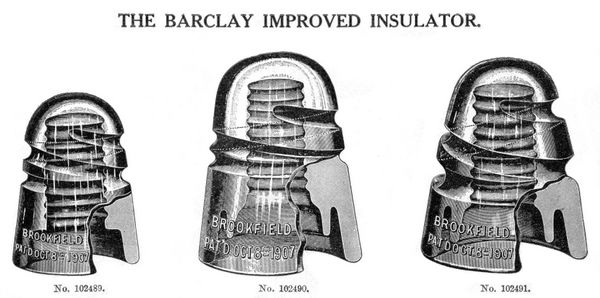IOTW CD 110
From Insulator Wiki (Wikilator)
| Revision as of 13:21, 21 April 2008 Bill Meier (Talk | contribs) (Reverted edits by Bill Meier (Talk); changed back to last version by Andrew Gibson) ← Previous diff |
Revision as of 15:21, 21 April 2008 Bill Meier (Talk | contribs) (→Insulator of the Week) Next diff → |
||
| Line 1: | Line 1: | ||
| - | == Insulator of the Week == | + | {{IOTW |number=CD 110 |date=Wed, 02 Jan 2008}} |
| - | '''CD 110''' - ''Wed, 02 Jan 2008'' | + | |
| == Embossing Types == | == Embossing Types == | ||
| '''Brookfield''' | '''Brookfield''' | ||
Revision as of 15:21, 21 April 2008
Contents |
CD 110 - Insulator of the Week on Wed, 02 Jan 2008
Nickname
None
Related Patents
None
Details
None
Questions
None
Discussion
None
Embossing Types
Brookfield
Brookfield/Pat. Oct. 8-1907 Known as the "baby spiral groove", being the smaller version of the CD 147 without an inner skirt (and similar to CD 150). It is a design patented by John C. Barclay of New York, NY to easily facilitate the replacement of damaged insulators without removing or replacing the tie wire.
Related Patents
Details
The CD 110 was only produced by Brookfield and is found in aqua, green, dark green, yellow green and green w/semi-blended olive amber. Other than light olive amber swirling, I don't recall seeing any examples with other contaminants in the glass, such as metal, rocks, steam, milk, large bubbles, etc. If you have such an example, please post a description and/or photo. I do not know how extensively these were used, only having one report in my database of aqua examples being found in Southern New York. If you know of other locations, please post them. All colors are scarce, but the deeper green and yellow green specimens seem to be the most difficult to acquire, and certainly the most desirable with collectors.
Here is a scan of an undated Western Electric bulletin ca. 1912 showing the Brookfield CD 110, 147 & 150 style Barclay spiral groove insulators. I believe Barclay was employed by AT & T at the time he patented this insulator but I cannot find the evidence at this moment.
Questions
How much later after the 1907 patent would you say they were first offered by Brookfield? Were they offered simultaneously with, or after the release of the more common CD 147 style? We do find them offered in the 1912 Brookfield catalog listed as No. 33 Pony External Thread Insulator.
Here is a picture from the ICON picture Poster
Also have a look at Jim Sinsley's site on spiral groove insulators.
These brief comments on the Insulator of the Week are presented to generate discussion and additional information on the topic from the ICON membership. Now it's your turn to share info and/or photos of your favorite CD 110s!
Discussion
Andrew Gibson commented on Fri, 4 Jan 2008
I've often wondered the "order" of the 110, 147, and 150. Were they all manufactured during the same period, or was there some changes over time?
The patent [1] is fairly clearly a CD 147. All three shapes were all certainly available by 1912 (see the Brookfield catalog, or Elton post of the Western Electric Catalog page [2]. Given the rarity of the 150 and 110, one could speculate that these two were not popular, and perhaps didn't get manufactured all the way up to 1920 or so when Brookfield went out of business. On the other hand, the CD 110 comes in Dark Green and Yellow Green as well as aqua, the CD 147 comes in Dark Yellow Green as well as aqua, and the CD 150 comes in just aqua. Are those Green and Yellow Green colors indicative of production towards the end of Brookfield's existence (say 1915 to 1920), or earlier (1910-! 1915)?
Then of course, one wonders about the Hemingray / Brookfield differences. The CD 147 PAT APP FOR presumably came first, and that's a Brookfield product. However, the NO EMBOSSING version is a Hemingray product, and could also have been made before the patent was granted. The CD 150 BARCLAY is a Hemingray product, and was made after the patent date. Did Brookfield manufacture these until they went out of business, then Hemingray took over, or did Hemingray and Brookfield both make these at the same time?
So, having said all that -- does anyone have any idea of when the CD 110 may have been introduced and when production of it may have ceased? Or answers to any of the other questions I raised?

